HOUSTON SCENE
Slim Thug
| Slim Thug | |
|---|---|
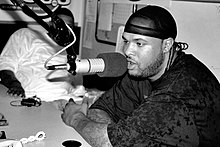
Slim Thug at the KDHT studio in 2005.
|
|
| Background information | |
| Birth name | Stayve Jerome Thomas |
| Born | September 8, 1980 Houston, Texas, U.S. |
| Genres | Hip hop, gangsta rap |
| Years active | 1998–present |
| Labels | Swishahouse, Star Trak, Boss Hogg Outlawz, Interscope, E1 , Rap-A-Lot |
| Associated acts | Boss Hogg Outlawz, Bun B, Chalie Boy, Chamillionaire, E.S.G., Mike Jones, Paul Wall, Riff Raff, T.I., Trae Tha Truth, Z-Ro |
| Website | www |
Stayve Jerome Thomas (born September 8, 1980),[1] better known as Slim Thug, is an American rapper. He gained mainstream attention for his contribution to the popular single from rapper Mike Jones, "Still Tippin'".
Early life[edit]
Slim Thug grew up in Houston's Northside neighborhood of Homestead/Scenic Woods. Slim says that his rap name came from the fact that as a teenager, he was very tall and lanky before he filled out.[citation needed] He stands 6'6" tall. The Thug part comes from people's assumptions of him due to his french braids and sunglasses.[citation needed] At age 17, he performed freestyle raps at local high school parties. He began his rap career with Swishahouse in the late 1990s. After realizing how much money he could make distributing his own mixtapes, he parted ways with Swishahouse on good terms and formed his own independent label, Boss Hogg Outlawz.[2] Thomas bought two record stores and worked in real estate.[1]
Music career[edit]
Already Platinum (2005–08)[edit]
Slim Thug's big debut album with Star Trak Entertainment & Interscope Records, Already Platinum, was released in July 2005 after many delays.[1] It premiered on #2 on the Billboard 200 albums chart and sold 130,000 copies in its first week.[3] Singles included "3 Kings" (featuring T.I. and Bun B), and "I Ain't Heard of That" (featuring Pharrell and Bun B). Slim Thug appeared on Still Tippin' with Mike Jones and Paul Wall, Beyoncé Knowles's #1 single "Check on It" and Gwen Stefani's "Luxurious". With the Boss Hogg Outlawz, Slim Thug released three albums, Boyz N Blue (2004), Serve & Collect (2007) and Back by Blockular Demand: Serve & Collect II (2008). He left Star Trak & Interscope Records in 2008.[4]
Boss of All Bosses (2009)[edit]
Slim Thug's second solo album Boss of All Bosses was released in 2009. Although not as successful as his debut album, Boss of All Bosses debuted at #15 on the Billboard 200 with 32,000 copies sold in the first week released. It included the single "I Run".
Tha Thug Show (2010–present)[edit]
Slim Thug's third studio album Tha Thug Show. His first single was "Gangsta" which featured Z-Ro. His second single featured rapper/singer B.o.B entitled "So High". It was released November 30, 2010. On April 23, 2013 he released a new EP titled Welcome to Texas EP featuring guest appearances from Rick Ross, Pimp C and Ludacris among others.[5]
Acting career[edit]
In October 2009 he appeared on The Daily Show, in a parody discussing the effects of the recession upon wealthy rappers such as himself.[6] The skit was filmed in part at The Lion's Den Recordings in Houston, Texas.
Personal life[edit]
Slim Thug dated singer LeToya Luckett until 2006.[7][8] He claimed the two broke up as a result of his cheating and having a child with another woman.[9]
According to MTV News, Lupe Fiasco's video for "Hip Hop Saved My Life" was based on Slim Thug's life story. "It is based on Slim Thug," Fiasco revealed.[10]
On June 7, 2010, Vibe released controversial statements Slim Thug had made regarding treatment of black men by black and white women saying "it’s hard to find [a successful black man] so Black women have to bow down and let it be known that they gotta start working hard; they gotta start cooking and being down for they man more. ...White women treat they man like a king."[11] The article elicited varied reactions from bloggers and online commentators.[8][12][13] Cultural critic and Columbia University professor Marc Lamont Hill[14] and singers Aubrey O'Day, D. Woods,[15] and Talib Kweli[16] have all responded publicly to his comments.
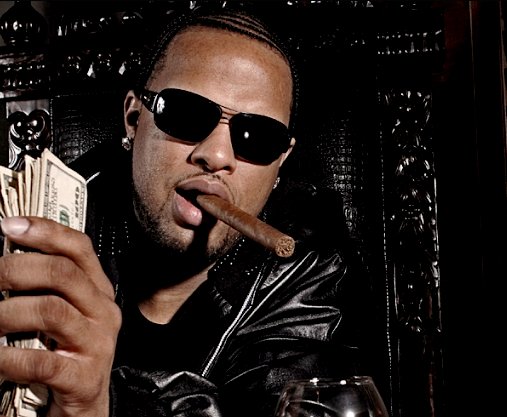
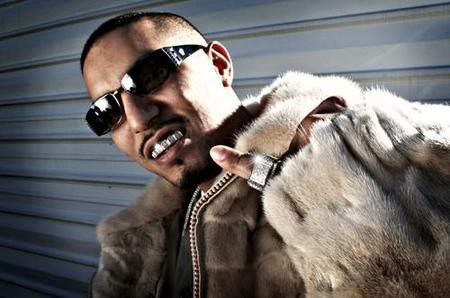
Deep underground; way below the mainstream music land of Top 40 Billboard Charts and MTV countdowns thrives another existence entirely, made up of independent, Houston Latino hip-hop artists who didn't get the memo. You know the one. It reads: "All aspiring artists must plead big record companies for the four jewels of rap - money, hoes, cars and clothes." Houston-based rapper Christian Garcia, better known as Lucky Luciano, is sitting on the throne of the Houston Latino hip-hop underground. For the past four years, the 28-year-old has executed a business blueprint drawn out by H-Town rap staples like Slim Thug, Chingo Bling and DJ Screw, to perfection. It looks like this: Build your own studio. Write and record your own music. Network so you get the beats for free or damn near close. Design and package the CD album yourself. Directly contact the merchants who sell music and strike a deal. Get your ass to the UPS store at 8 a.m. every day and ship your product out to anywhere from San Antonio to Japan. That's the life of Lucky Luciano.

If you don't know him because you don't speak "underground" - only "mainstream" - well, that's understandable. New land. New language. Let's open up the translation dictionary.
Lu-cky Lu-ci-an-o:
- A 28-year-old hip-hop hybrid of Houston's Black urban influence, 90s Southern rap funk and the type of entrepreneurial spirit that lives in Latino new-comers who go from dish-washer to Mexican restaurant chain-owner.
- A person who has distributed nearly 20 mix tapes since going independent in 2006 and has die-hard fans who religiously buy his music.
- A person knee-deep in six-figure earnings through mix tapes, features on other artists' tracks and roadshows.
- 2009 Texas Latin Rap Awards' Artist of the Year.
That's Lucky in a definition, but you won't find any lucky charms in his life's cereal. The Eisenhower High School dropout is all hustle, and through the last decade has charted an untraditional course, going from belonging to a label and hitting mainstream by being featured on and collecting royalties from a platinum-selling Baby Bash album, to mastering the underground way of making and selling your own music - not vice versa. No middle man. No taxes.
Signing with South Park Mexican's Dope House Records in 2002, his advance was a $10,000 check and a Cadillac Escalade, and he admittedly did what the typical Meskin from the hood does when they get a little change in their pocket: Act rich. "I was spending all my money at strip clubs, buying steaks for my friends, and spending money on my addiction to drugs and alcohol," Lucky tells Rocks Off. "I crashed a Mercedes and flipped a Tahoe. I was forced to do the independent thing, because I ran out of money. I had to make mix tapes because I couldn't afford beats." Today he's married with two kids, drug and alcohol free...and focused. He has to be, as Lucky is at the helm of a movement that's quietly writing an entirely new chapter in the history book of Southern hip-hop. They're Latin rappers selling out shows from Oklahoma to Phoenix to California's Bay Area, building a rich fan base who are making their pockets rich, too. They're following Lucky's lead, because lyrically and business-wise, he's arguably best in the Latino rap game, but if you see him in the streets, don't give him your demo. As they say, just follow suit. "Why do you want to give me your demo?" asks Lucky. "Make your CD and go sell it. And if it's good it'll sell and if not, do something else with your life." Deep underground, it's kill what you eat. You make your own Lucky. I mean, luck. Rolando Rodriguez is managing editor of www.redbrownandblue.com. Email him at Rolando@redbrownandblue.com.
Originating in the Southern rap mecca of Houston, South Park Mexican (SPM) slowly built up his own personally run record label, Dope House Records, for years before eventually signing a distribution deal with Universal Records. With the promising deal in place, SPM stood on the verge of extending his reach outside of the South and becoming one of the first Mexican-American rappers to attain national success. Unfortunately, he never fulfilled his promise. First, his releases for Universal failed to top the charts in the early 2000s, and then he went to prison in June 2002 after a Houston jury convicted him of sexual assault.
Before he became South Park Mexican, Carlos Coy spent years in the dope game. Born in Houston's predominantly Hispanic South Park neighborhood, he committed his first felony at the tender age of ten and continued on a path of crime, eventually getting involved with drugs by his teens. After several years of hustling on the streets, he finally got out of the dope game after a deal went bad. Around the same time, his daughter was born, causing him to re-examine his priorities. It was at this time in 1994 that Coy turned to a new hustle: the rap game. Even though he had never really rapped before, he started his own record label and began honing his rhymes. At first he did what he could, hustling tapes for five dollars apiece in his neighborhood, and by the late '90s, he was putting out his own CDs on his label. His two 1998 albums -- Hustle Town and Power Moves -- established him in the South as an up-and-coming rapper and his rigorous touring throughout Texas won him even more fans.
Coy won a deal with Universal following releases in 1999 and 2000 -- 3rd Wish to Rock the World and The Purity Album, respectively -- and had his Time Is Money album on the streets by the end of 2000. The following year, he returned with his second album for Universal, Never Change. Though Universal heavily marketed the album, as it had done with Time Is Money, the results were similar -- no crossover. Big marketing budget or not, Coy's hardcore rapping proved to be too harsh for the masses. His 2002 release, Reveille Park, a collection of freestyles, proved no different, especially since Universal chose not to release it. Finally, Coy met his fate on May 18, when a Houston jury convicted him for aggravated sexual assault; in June the same jury sentenced him to 45 years in
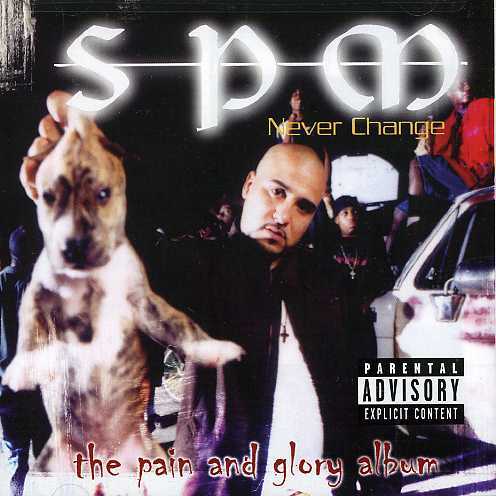
*SHALIEK*
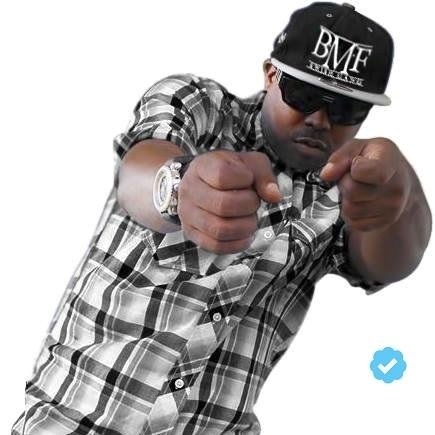
The Artist Known As Shaliek Mendoza is a Lyricist Out Of
Austin TX His Content reflects The Hustle & The Struggle.
He is a Independent Artist Down With The SwishGang ,
SwishGang is More then A Team And A Label its A Movement
Lead By Ceo Artist Calico Jonez President Of The BMF Label.
Shaliek Mendoza Has Done Songs With Major Artist Such As
Snoop Dogg ,Young Buck & Daz Dillenger.
Shaliek is a Entrepreneur He is one of a few Independent Artist
with his own Custom Made SwishGang Converse Chucks Sneakers
Designed By Punk Your Chucks.
He Has Currently released on the Internet A Mixtape Titled Hash
He Work With Slip N Slide Dj Gezza on the Project , He is planning
to Throw NationWide Events For The Mixtape.
He Also Work With International Djs Out of Germany , Zimbabwe &
Canada , Shaliek Buzz is geting Stronger each & everyday on Social Networks.
He Stay Active And Productive Daily If he not Shooting Videos he is
in The Studio He Has a Hard Working Push It to the limit Work Ethic.
*RASHEED*
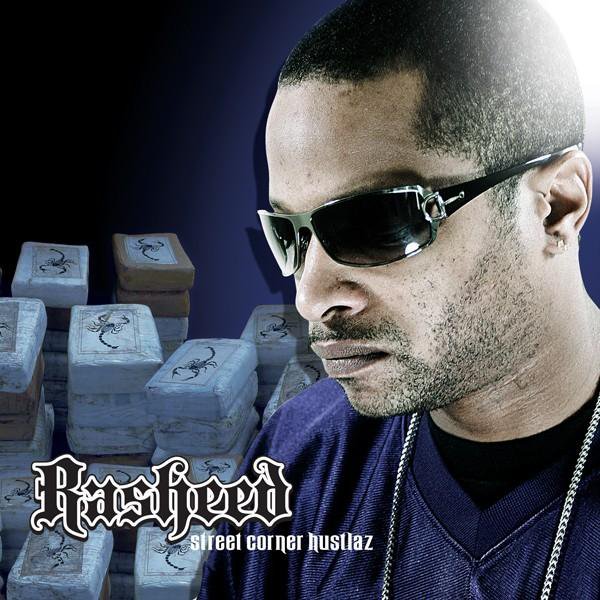
Artist Biography by Bradley Torreano
Recognized for his speedy delivery and chilly beats, Rasheed came out of the East Coast battle-rap scene to become one of the driving producers at Dope House Records. Growing up in Philadelphia, he studied poetry as a teenager, encouraged by his teachers to add a depth to the raps he would bust out in school. He became a regular on the battle circuit, often traveling to New York City to take part in competitions. Moving to Houston in his late teens, he began to hook up with various local rappers and even released an independent EP, Livin' in D Ghetto, in 1994. Although he recorded a full-length album (Funk Is in the Air ) later in the year, he was incarcerated soon after its release and didn't get the chance to promote it. Still, Dope House Records was impressed by his self-made albums, and when he was released in 1996, they welcomed him into their collective. Producing and rapping with Lil' Troy and Kid Frost, among others, he dropped the "Internal Affairs" single in 1999, followed the next year by Let the Games Begin. Showcasing his quick lyrical assault and funky Dirty South-style production, the album cemented his partnership with South Park Mexican, the driving force behind his new label. Before South Park's incarceration in 2002, Rasheed contributed raps and beats to both his SPM: The Purity Album and Never Change releases, as well as several more Dope House albums.
